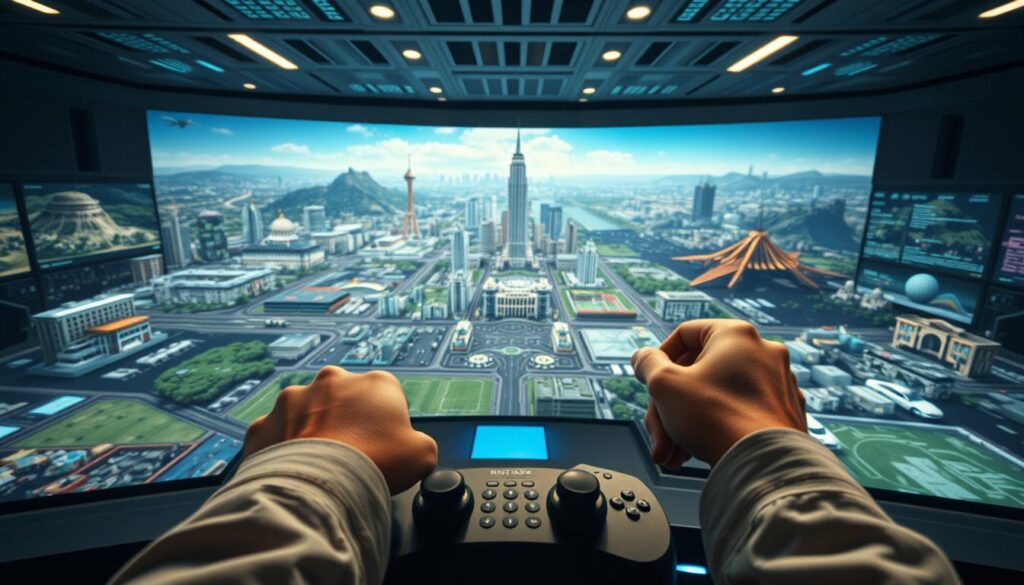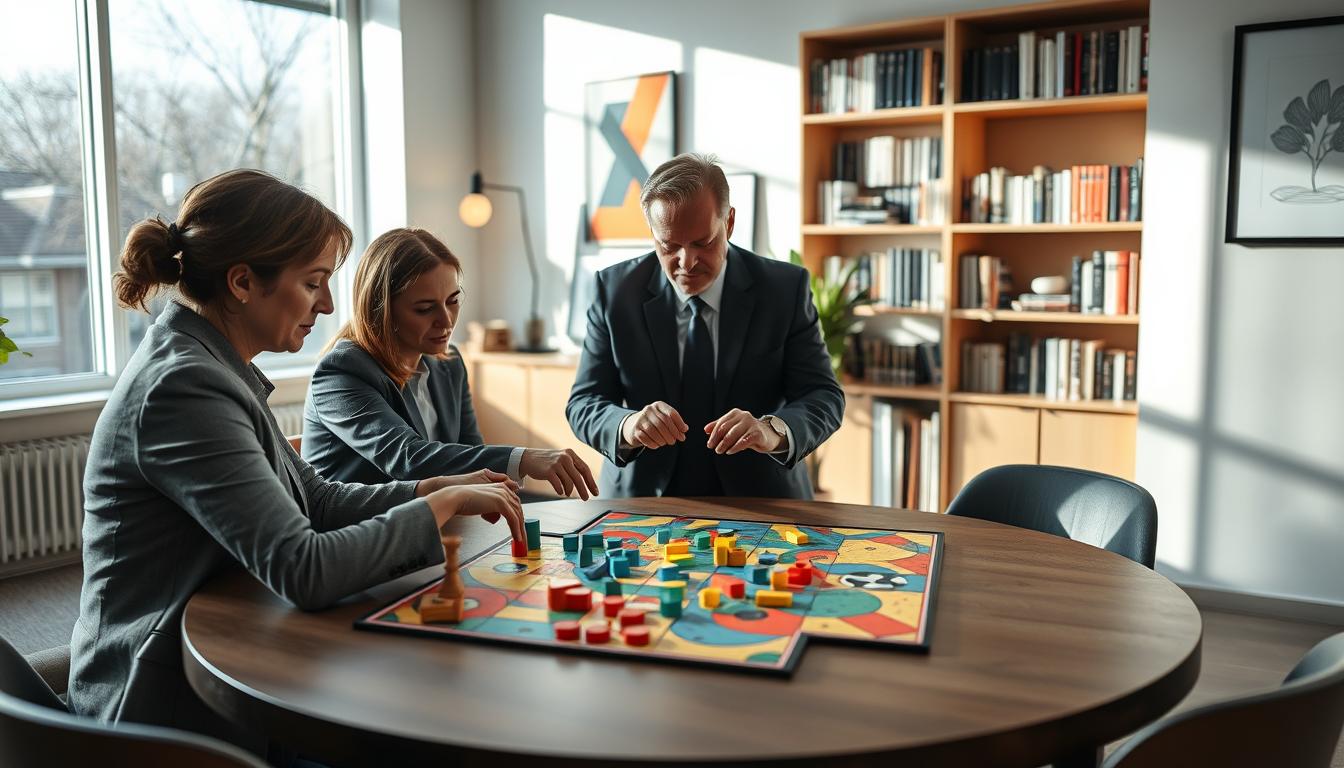Simulation games that enhance decision-making under pressure
Imagine a game that trains you to make quick decisions that could save lives. Simulation games are becoming key tools for improving decision-making under pressure. They help bridge the gap between learning and real-world application.
As demands rise in many fields, the ability to make fast decisions is more important than ever. These games sharpen critical thinking, promote strategic planning, and foster teamwork. This article explores how simulation games change our approach to complex decisions.
It offers insights and practical tips that are both fun and enlightening.
Introduction to Simulation Games
Simulation games are interactive platforms that mimic real-world situations. They help improve decision-making skills. These games are great for learning in both school and work settings.
They let people try out different scenarios without real risks. This makes learning more fun and engaging. It also helps users think critically about various situations.
The history of simulation games starts with military and aviation training. Now, they are used in healthcare, business, and education too. Companies and schools use them to make learning more real and effective.
As technology gets better, so do simulation games. More businesses and schools are using them. This change is making learning more exciting and meaningful.

The Importance of Decision-Making Under Pressure
Good decision-making under pressure can change a business’s path. When urgent challenges arise, employees need to think fast. They must quickly evaluate options and predict outcomes.
This quick thinking shapes team dynamics and affects success. It’s crucial for the organization’s growth.
Stress affects how we process information, making it harder to analyze complex data quickly. To improve, organizations can use simulation exercises. These mimic real-life pressures.
Such training helps individuals think on their feet and make sound decisions under stress. It’s a key part of being prepared.
Studies show a strong link between quick decision-making and success. This highlights the importance of these skills in competitive settings. By training in these areas, companies can build a team ready to face challenges head-on.

Types of Simulation Games
Simulation games are designed for different training goals. They help in learning through interactive experiences. Knowing the types can make them more effective in teaching decision-making.
Crisis simulations test quick thinking and fast decision-making. Role-playing games help build empathy and understanding. Competitive team challenges improve teamwork and strategy under pressure.
The table below shows different simulation games. It highlights their main features and what they aim to teach:
| Type of Simulation Game | Core Features | Training Objectives |
|---|---|---|
| Crisis Simulations | Real-time problem-solving, adaptability | Enhance rapid decision-making skills |
| Role-Playing Games | Character immersion, scenario-based learning | Build empathy and communication |
| Competitive Team Challenges | Team collaboration, strategic thinking | Improve teamwork and negotiation skills |
| Business Simulations | Real-world economic environments, resource management | Understand market dynamics and decision impacts |
Harvard Business School and Capsim offer many simulation games for different fields. Choosing the right game can help improve decision-making skills.
Benefits of Simulation Games for Professionals
Simulation games offer many benefits for professionals, making their work better. They help improve skill development, sharpening critical thinking and strategic planning. This is key for success in their careers. Many companies use these games in their training to help both individuals and teams grow.
Simulation games are great for teamwork. They let people work together to solve problems. This boosts communication and teamwork skills, essential for a productive work environment.
Companies that use simulation games see their employees more engaged and motivated. Learning becomes fun, and people remember what they learn better. This leads to better performance and smarter decision-making in the workplace.
Top Simulation Games for Fast Decision-Making
Simulation games are great for improving quick decision-making skills. The Crisis Challenge is a top pick. Players face unexpected scenarios and must make key choices fast. This game helps you adapt quickly, a key skill in any job.
Dot Voting is another great game. It makes you vote on options fast. This game creates a sense of urgency and teamwork. It helps you make quick decisions, a skill needed in work.
The Survival Scenario puts you in tough emergency situations. You have to weigh risks and rewards. This game shows how pressure can make you better at making decisions.
| Game Title | Objectives | Gameplay Mechanics | Outcomes |
|---|---|---|---|
| The Crisis Challenge | Navigate crises and make timely decisions | Scenario-based with real-time challenges | Improved adaptability and quick thinking |
| Dot Voting | Quickly prioritize and vote on options | Limited voting mechanism to foster urgency | Enhanced collaborative decision-making skills |
| The Survival Scenario | Make critical choices in emergencies | Life-or-death scenarios requiring risk assessment | Strengthened capacity for handling pressure |
These games are fun and help you get better at making fast decisions. They prepare you to handle tough situations at work.
Understanding the Decision-Making Process in Simulation Games
Simulation games require players to balance analysis, risk, and strategy. They face complex scenarios that mirror real life. This demands critical thinking and fast action.
Players must spot problems, consider outcomes, and choose the best actions. This helps them reach their goals.
Key parts of decision-making in these games are:
- Scenario analysis: Looking at the game’s context and variables.
- Risk assessment: Finding the risks and benefits of each choice.
- Strategy implementation: Using strategies to solve challenges.
Studies show different approaches in simulation games. For instance, a pilot training might focus on quick reactions and accuracy. A business simulation could emphasize long-term planning and managing resources.
These games teach valuable decision-making skills. They help players improve in real-life situations.
Grasping the decision-making process makes simulation games more effective. It boosts participant performance in real-world tasks.
How Simulation Games Foster Team Collaboration
Simulation games make teams work together by setting up scenarios that need teamwork. Players must talk and plan to win. This teamwork boosts problem-solving and strengthens team bonds.
Simulation games help teams work better together. They learn to communicate clearly and work as a team. Everyone knows their role and how it helps the team succeed.
| Aspect | Before Simulation Training | After Simulation Training |
|---|---|---|
| Communication Effectiveness | Low clarity, frequent misunderstandings | High clarity, direct and verbal exchanges |
| Team Accountability | Variable commitment among members | Strong ownership of individual roles |
| Goal Alignment | Misaligned objectives | Unified vision and shared objectives |
| Conflict Resolution | Frequent disputes | Effective collaboration to address differences |
Studies show teams do better after simulation training. Players say they work better together. This shows how simulation games help in real life too.
Brain Games for Fast Decision-Making
Brain games help improve fast decision-making skills. They are great for sharpening your mind. Playing these games can make you better at thinking critically and strategically.
By playing, you learn new ways to make decisions. This is especially helpful in situations where you need to act quickly.
Analysis of Decision-Making Strategies
Brain games offer a peek into real decision-making. They use scenarios that feel like real life. This makes players think fast and make smart choices.
Games focus on critical thinking. They teach players to weigh risks and rewards quickly. You’ll learn to consider different options and outcomes.
Enhancing Critical Thinking Skills
Critical thinking is key for quick decisions. Games that challenge you to solve problems on the spot are great for this. They make you think deeply about your choices.
Games like Pre-Mortem Analysis help you see potential problems. This way, you can make better decisions. It sharpens your thinking and improves your decision-making skills.
Real-Time Crisis Simulations
Real-time crisis simulations put participants in urgent situations. They must react fast and handle complex problems. These simulations help develop the skills needed in high-pressure situations.
Scenarios are designed to mirror real-life challenges. This pushes participants to make quick, critical decisions. The consequences of these choices are immediate.
For example, the Customer Complaint Simulation forces participants to deal with unhappy customers. This experience shows how crucial good communication and strategy are in unexpected situations.
The main aims of crisis simulations are to improve adaptability, teamwork, and strategic thinking. By facing real-time scenarios, participants prepare for actual crises. They learn to think quickly and solve problems more effectively.
In short, real-time crisis simulations are key in professional development. They help participants become more proactive in decision-making. They also build resilience for today’s fast-paced world.
Incorporating Ethics in Decision-Making Games
Simulation games become more meaningful when ethics are included. Players face tough moral choices, learning to weigh their decisions against ethical standards. This helps them understand the importance of ethics in decision-making.
Workshops on ethical dilemmas are a key part of these games. They help players think critically and make responsible choices. This prepares them for making ethical decisions in their careers.
Adding ethics to games has a big impact. Players see how their choices affect others. This helps them make better, more ethical decisions in real life.
The Role of Feedback in Simulation Games
Feedback is key in improving decision-making skills in simulation games. Players get insights on how they’re doing. This helps them understand their choices and outcomes better.
It shows where they need to get better and why thinking about their actions is important.
Feedback systems are vital for a better gaming experience. Players face challenges that test their quick thinking and strategy. Feedback helps them make better choices, leading to growth and expertise.
Continuous Improvement of Decision-Making Skills
Simulation games help improve skills through practice. Players get feedback that lets them rethink their strategies. This builds resilience and adaptability, key for making good decisions under pressure.
Experts say feedback is crucial for improving performance. It pushes players to question their beliefs, try new approaches, and learn from errors. This boosts their decision-making skills in real life.
Exploring Interactive Business Simulations
Interactive business simulations are a fun way to face real business challenges without risk. They offer a dynamic space for users to hone their strategic thinking. Here, they learn about managing resources and understanding market trends.
Platforms like INSEAD’s Strategy Simulation Suite and GLO-BUS provide detailed experiences. They mimic real business scenarios. Users compete to make smart choices, learning about market behaviors and strategies.
| Platform | Description | Focus Area |
|---|---|---|
| INSEAD Strategy Simulation Suite | An immersive simulation focusing on strategic management and competitive dynamics. | Strategic Decision-Making |
| GLO-BUS | A multi-business simulation where teams manage a company in a global market. | Resource Allocation |
| Capsim | A simulation that emphasizes decision-making across various business functions. | Comprehensive Business Strategy |
These simulations help leaders in training develop crucial skills. They learn to make strategic decisions in a safe space. This prepares them for real business challenges.
Game Design Elements that Enhance Retention
Simulation games have special design elements that help players remember what they learn. These elements make players more active and engaged. This is key for keeping knowledge in their minds.
Important parts that make players interact more include:
- Interactivity: When players take part in the game, they remember more. Interactive parts, like making choices and controlling actions, help them connect with the game better.
- Narrative: A good story grabs players’ attention. It makes them remember what they learn. When players care about the characters and story, they remember more.
- Reward Systems: Rewards and achievements motivate players to learn more. Seeing their progress makes them want to keep playing. This is important for remembering what they learn.
These design features make learning fun and effective. They help players understand and use what they learn in real life. This makes learning a fun and rewarding experience.
Customizable Simulation Scenarios
Customizable simulation scenarios let organizations create training that fits their needs. These scenarios adjust to different levels of complexity and settings. This makes it easier for people to learn about topics that matter to them.
These scenarios can be changed by instructors. This lets users face real-life problems in a safe way. It helps them learn and grow in their careers.
These flexible scenarios make learning better. They add challenges specific to each industry. This way, learners can practice in a setting that feels like their real job.
Studies show that tailored simulations boost training success. Employees feel more confident and skilled. This is because the training matches their learning style.
These customizable options make training more effective. They prepare people to make decisions in tough situations. It’s a win-win for everyone involved.
Evaluating the Effectiveness of Decision-Making Simulations
It’s important to understand how well decision-making simulations work. This helps us see if they improve skills and help businesses grow. By carefully checking how well people do in these simulations, we can make training better.
Measuring Outcomes and Success Rates
There are many ways to check if simulations are effective. We look at what people say, how well they do, and if they succeed in real life. Using all this information helps us really know if simulations are working.
Here are some important things we check:
| Metric | Description |
|---|---|
| Participant Feedback | Collecting qualitative and quantitative feedback on the simulations’ relevance and impact on decision-making abilities. |
| Performance Assessments | Measuring the participants’ performance improvements through pre- and post-simulation assessments. |
| Success Rates | Analyzing the percentage of correct decisions made during simulations compared to real-life applications. |
By looking at this data, we learn how people are growing and what needs to get better. Companies using these simulations can always make their training better.
Conclusion
Simulation games are key for improving decision-making, especially in tough situations. They let professionals practice in real-like scenarios. This helps them think critically and work together better.
Using simulation games in training is very beneficial. They get people ready for quick decisions in their jobs. They also help build a team that can handle new challenges.
Looking ahead, we should study how simulation games can be used in many areas. By finding out how to use them in different places, we can make our teams even better. This will help us face future problems with confidence.
FAQ
What are simulation games?
Simulation games are like interactive movies. They let you try out real-life situations in a safe space. You can practice making decisions without the real-world risks.
Why is decision-making under pressure important?
Making good decisions quickly is key. It helps teams work better and businesses succeed. In stressful times, being able to choose fast and right is crucial.
What types of simulation games are available?
There are many kinds of simulation games. You can find crisis simulations, role-playing games, and team challenges. Each one is made for different learning goals.
How do simulation games benefit professionals?
These games improve your thinking and planning. They help you work better with others, communicate well, and get along with people. All these skills are important for teamwork.
Can you provide examples of top simulation games for fast decision-making?
Yes, games like The Crisis Challenge, Dot Voting, and The Survival Scenario are great. They help you make quick decisions through fun gameplay.
How do participants engage with decision-making processes in simulation games?
Players look at scenarios, figure out risks, and plan strategies. They use decision-making tools to solve problems and analyze situations.
What role do simulation games play in fostering team collaboration?
These games make teams work together. They help build teamwork, improve communication, and make everyone understand their goals better.
What are brain games, and how do they relate to decision-making?
Brain games are activities that make your brain work harder. They challenge you to think strategically and solve problems. This helps improve your decision-making skills.
What are real-time crisis simulations?
Real-time crisis simulations are urgent scenarios. They require quick decisions. Players learn from these simulations and gain valuable experience.
How do ethical dilemmas factor into simulation games?
Ethical dilemmas are added to teach players about complex moral issues. They learn to make decisions that align with ethics and values.
Why is feedback important in simulation games?
Feedback is key. It helps players learn and get better. It’s a way to improve decision-making skills through structured feedback during the game.
What does interactive business simulation involve?
Interactive business simulations let learners tackle real business challenges safely. They learn about strategic decision-making and market dynamics in a risk-free setting.
What design elements enhance learning retention in simulation games?
Design elements like interactivity, story, and rewards keep players engaged. These elements make learning fun and help players remember what they’ve learned.
How can simulation scenarios be customized?
Scenarios can be tailored to fit specific training needs. They can include different levels of complexity and challenges from various industries. This makes training more effective.
What methods are used to evaluate the effectiveness of decision-making simulations?
Effectiveness is checked through feedback, performance, and success in real situations. This helps improve training programs over time.














